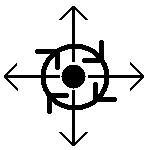Difference between revisions of "Frinastism"
| Line 7: | Line 7: | ||
==The Gods== | ==The Gods== | ||
[[Image:Frinastism.GIF|frame|An element circle, which is the sybol Frinasism and its gods]] | [[Image:Frinastism.GIF|frame|An element circle, which is the sybol Frinasism and its gods]] | ||
| − | There are six | + | While Frinastists worship many different gods, not all of them being worshipped by all frinasts and some only in certain cities, There are six main gods, known by Frinsastists as "The Six Divines". These gods are considered the most important of all the gods, as required by nine duties. The full names of the six divines are: |
| − | - Endras, god of the time | + | - Endras, god of the time |
- Gildii, goddess of the winds | - Gildii, goddess of the winds | ||
| Line 20: | Line 20: | ||
- Dondre, goddess of the land. | - Dondre, goddess of the land. | ||
| − | |||
| − | |||
==The Nine Duties of Frinastism== | ==The Nine Duties of Frinastism== | ||
| Line 36: | Line 34: | ||
fith duty: Thou must not Marry one who is not follower of frinastism. (often ignored nowadays) | fith duty: Thou must not Marry one who is not follower of frinastism. (often ignored nowadays) | ||
| − | sixth duty: Thou must accept that the | + | sixth duty: Thou must accept that the six divines are the most most gods. |
| − | seventh duty: Thou must accept that the six | + | seventh duty: Thou must accept that the six divines are equal. |
eigth duty: Thou must not allow one who is not a follower of Frinastism into a Frinastist temple. | eigth duty: Thou must not allow one who is not a follower of Frinastism into a Frinastist temple. | ||
ninth duty: Thou must make a six day pilgramage to the one and the only grand temple once in thy life. | ninth duty: Thou must make a six day pilgramage to the one and the only grand temple once in thy life. | ||
Revision as of 18:51, 4 June 2007
| Frinastism | ||||||||||||||
|---|---|---|---|---|---|---|---|---|---|---|---|---|---|---|
|
General information
Frinastism is a Polytheistic Religion widely followed in Swilatia (Ranked second on ceensus, with atheism taking first) and Khenas, but almost never followed in other nations. Frinastism has its roots back to Ancient Swilatia, as it evolved from ancient swilatian beliefs. Frinastism has six major gods and thousands of minor gods. Frinastists believe that one is reincarnated the second they die, and when the world, and the with it the reincarnation cycle, ends, they will make it to paradise, but only if they follow the nine duties. The name Frinastism comes from the ancient swilatian word Frinase, whcih means truth, as many Frinastists believe that Frinastism is the only true religion.
Very long ago, Frinastism was the state religion of Swilatia, but now the government of Swilatia offers the citizens of Swilatia freedom of religion, and it also endorses Atheism. While ths is not a problem to most swilatians, as Swilatia is mostly an atheist nation, some Frinastists oppose the state endorsement of atheism, and there is a terrorst organisation in Swilatia which states that its goal is to restore the Frinistast religion to Swilatia, no matter what the costs. Also, even though it is not the state religion in Khenas, as Khenas is a secular nation, Frinastism has for a long time been followed by the royal family of Khenas.
The Gods
While Frinastists worship many different gods, not all of them being worshipped by all frinasts and some only in certain cities, There are six main gods, known by Frinsastists as "The Six Divines". These gods are considered the most important of all the gods, as required by nine duties. The full names of the six divines are:
- Endras, god of the time
- Gildii, goddess of the winds
- Montha, god of the sun
- Aranga, goddess of the water
- Fillimir, god of the fire
- Dondre, goddess of the land.
The Nine Duties of Frinastism
Frinastism, like Judaism, Christianity, and Islam, has rules which every follower of the religion must abide by, called the nine duties, which are:
first duty: Thou must pray to the six major gods every day, each at a different time of day.
second duty: Thou must not speak the name of any god, major or minor, when outside a frinastist temple.
third duty: Only the high priest shall wear yellow clothing on a monday.
fourth duty: Thou must make mondays, and no other day except holidays holy.
fith duty: Thou must not Marry one who is not follower of frinastism. (often ignored nowadays)
sixth duty: Thou must accept that the six divines are the most most gods.
seventh duty: Thou must accept that the six divines are equal.
eigth duty: Thou must not allow one who is not a follower of Frinastism into a Frinastist temple.
ninth duty: Thou must make a six day pilgramage to the one and the only grand temple once in thy life.

